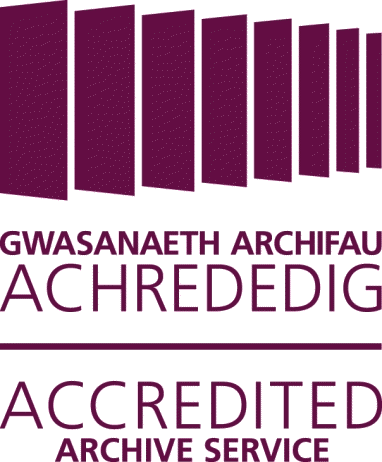CEREDIGION ARCHIVES COLLECTIONS INFORMATION POLICY
1. Introduction
1.1 The Definition and Role of Archives was given by Archives for the 21st Century, (The National Archives, 2009) as follows: “Archives are the record of the everyday activities of governments, organisations, businesses and individuals. They are central to the record of our national and local stories and are vital in creating cultural heritage and supporting public policy objectives. Their preservation ensures that future generations will be able to learn from the experiences of the past to make decisions about the present and future”.
1.2 Archives provide rich and vital sources of evidence about past and present life. This evidence is unique in its ability to foster and inspire a sense of place, time and belonging. Archives help to bring the past to life, help us to understand why our present world is as it is and support the role of today's citizen. They provide authoritative evidence of past events for everyone to use, for educational, and academic, social, legal, business, medical and other uses. Archives may be used to solve problems and defend rights, and to cultivate pride in individual and community identities.
1.3 Archives are created as documentation to accompany human processes of many kinds. As time passes these records are often the sole survivors of organizations, institutions and individuals, and provide unique evidence, however flawed, of past events and previous generations.
Archives and documents in all media (including paper, parchment, maps, plans, photographs, films and electronic) provide unique evidence of the historical development of places and people’s daily lives.
1.4 Ceredigion Archives (and its predecessor body Dyfed Archives, Cardiganshire Area Record Office) has protected the archival record since its creation in 1974, safeguarding irreplaceable information assets for current and future use by means of correct management of the archives to professional standards. We collect, protect, preserve, manage, share and promote the archival legacy of the county of Ceredigion and Cardiganshire for the use of current and future generations.
We also contribute to the modern county of Ceredigion achieving its priorities especially with regard to sustainable development, a strong economy, better education and skills and independent healthy living; and we act, with our Information and Records Management Service, as the corporate memory of the authority and its predecessor bodies.
1.5 Statutory framework for the archive service is provided under:
• Local Government Act 1972 and Local Government (Records) Act 1962
• Local Government (Wales) Act 1994 section 60
• Parochial Registers and Records Measure 1978
• Public Records Acts 1958 and 1967
1.6 Access to collections complies with:
• Freedom of Information Act 2000
• Data Protection Act 1998
• Environmental Information Regulations 2005
2. Mission Statement
To preserve, manage and make available evidential material (both historic and contemporary) relating to the county of Ceredigion through our Archive Service, and to support the local authority through our Information and Records Management Service. To make the information in our care available to all who need it, within a framework of legal compliance and a good understanding of our user’s needs. To provide training in Information Security and Data Protection to the authority and to have responsibilities for, and an advisory role in the responses to Subject Access Requests for the authority.
3. The Purpose of this Policy
3.1 This document sets out the Collections Information Policy for Ceredigion Archives (hereafter “CA”) and explains how we aim to maintain and provide accurate documentation of our collections for the purpose of their improved control and access. It supports our Mission Statement as set out above and should be seen in conjunction with CA’s Forward Plan, Collections Development Policy, Depositors’ Agreements and other relevant policy documents.
3.2 Adequate and appropriate information about the archival collections must be collected, recorded, arranged and made available as appropriate.
3.3 CA aims to make collections as accessible as possible by offering collections information to our audiences using a variety of methods including, and primarily, online catalogues.
3.4 This Policy defines the information that CA will gather and provide about its archival collections.
4. Collections Information
4.1 CA captures information at various stages during the processing of a collection, from its point of deposit or donation through to its accessioning, cataloguing and subsequent development, and as information legislation affecting archives is introduced and modified.
This Policy covers information gathered:
• At point of deposit /donation
• During the accessioning process
• During cataloguing (including accruals)
• Through location and movement control
• Regarding demand, usage and disposal
• Regarding physical condition, preservation and conservation activities
4.2 This information is recorded and maintained in a variety of places and formats. These include but are not limited to:
• Depositor / Donor forms
• Electronic Accessions Database
• Ceredigion Archives’ online catalogues (www.archifdy-ceredigion.org.uk)
• Electronic Locations Database
• Manual Document Request Slips
• Depositors’ Correspondence Files (partly paper, partly electronic)which may be used to augment the information found in accessions and catalogue records
4.3 CA will take steps to record the information required to ensure digital materials are preserved and can be retrieved and used.
5. Point of Deposit/Donation and Accessioning
5.1 Accurately recording the provenance of deposited and donated material within the custody of the Archives is important in preserving the integrity of the documents and collection in our care. In order to achieve this CA will accession every donation, loan, purchase and bequest of records. This includes recording information needed to authenticate the ownership and legal status of material.
5.2 Donors and depositors are requested to complete a donation / deposit form and receive Ceredigion Archives’ Conditions of Deposit. A copy of the donation / deposit form signed by the donor / depositor and counter-signed by Archives staff is created and retained by CA. A further copy is created as a receipt and acts as the donor / depositors’ evidence of donation / deposit. This receipt, in conjunction with the Conditions of Deposit, is legally binding.
5.3 CA seeks to retain ongoing contact with depositors to ensure that that information on the ownership and provenance of collections is up-to-date.
5.4 A manual accession register has been maintained by the Archives from the creation of its predecessor body, Dyfed Archives, Cardiganshire Area Office, in 1974 until 2005. In 2005 an Access database was created which is still used. All accessions from 1974 – date are maintained on the database.
5.5 All deposits and donations are allocated a unique sequential accession number. These numbers are subsequently linked to catalogue references for traceability.
5.6 Information captured and recorded on the accession register includes:
• Date of deposit or donation
• Name and contact details of depositor(s) or donor(s)
• Accession number, title and summary description of deposit
• Extent of deposit
• Approximate creation dates of deposit
• Accession category (Donation, Deposit, Purchase, Transfer etc.)
• Access restrictions
• Administrative and custodial history where known
5.7 CA participates in The National Archives' annual Accessions to Repositories Survey to enable up-to-date information to appear on TNA’s Discovery facility. Summaries of new accessions also appear on Ceredigion Archives’ website.
5.8 In keeping with Data Protection restrictions and the confidentiality of the agreement made between CA and the depositor(s) and donor(s), full details of the Accessions register will not normally be made available to the public, unless there is prior agreement from the depositor(s) / donor(s).
5.9 CA records information about the physical condition of collection during accession. This information is used to inform future work programmes to catalogue, conserve and provide access to material. Access to material identified as particularly fragile may be restricted or closed pending appropriate work to stabilise items and ensure they can be safely handled.
6. Cataloguing (including Accruals)
6.1 CA does not use cataloguing software. CA follows cataloguing guidelines developed within the institution and based on the fundamental multilevel description rules outlined in ISAD(G)
• Description from the general to the specific
• Information relevant to the level of description
• Linking of descriptions
• Non-repetition of information
6.2 The seven essential elements of any catalogue are as follows:
• Reference number(s)
• Title
• Creator
• Covering date(s)
• Extent
• Level of description
• Scope and content (description)
Depositor details are omitted from catalogues under the terms of the Data Protection Act 1998.
6.3 CA has a small cataloguing backlog which it seeks to tackle in different ways according to the most appropriate response for the collection. These may include
• Seeking project funding to catalogue a discrete collection
• Using supervised volunteers to assist in some parts of the cataloguing process.
• Allotting staff time for cataloguing a discrete collection after evaluation (see 6.4)
6.4 CA will determine cataloguing prioritization for larger collections using an adapted version of the Logjam methodology to calculate cataloguing time and provide a rationale for decisions, based on anticipated demand, physical condition, size and complexity and significance. CA will usually catalogue smaller deposits/donations within a short period of accession. Upgrading and revision of older catalogues to ensure they meet current standards is an ongoing process.
6.5 Accruals may be added to existing collections but may be catalogued separately using the references for the collection but adding the term ‘addl’ (additional).
7. Catalogues
7.1 The catalogue for Ceredigion Archives is online. As new catalogues are completed they are web-mounted. Catalogues are created in the majority language of the collection.
7.2 Copies of catalogues are maintained on the servers of the authority to prevent the total loss of data in the event of catastrophic damage to the website.
7.3 Catalogues in the search-room are accessed online using the public access computers.
8. Restrictions and Closure Periods
8.1 The collections include records subject to access restrictions and closure for determined periods of time. These closure periods may be determined by Data Protection legislation, advice and guidance from The National Archives and the Information Commissioner's Office or imposed by the depositor. CA will review existing catalogued collections to ensure that sensitive or personal information is not released.
8.2 CA encourages depositors not to impose undue restrictions on access to collections.
8.3 Users are made aware of restrictions and their rationale and staff follow documented procedures when advising users of the steps necessary to gain access to particular classes of restricted records.
9. Location and Movement Control
9.1 To help fulfil its obligations of care to the archive material it holds and to the depositors of such material, CA always aims to maintain up-to-date information on the locations of all items in its care.
9.2 Duplicate retrieval slips are utilised when documents are withdrawn from the strong-rooms for any use. This provides an audit trail of usage and use of these slips forms part of the contract between CA’s researchers and the institution.
9.3 Depositors wishing to withdraw their own archive material temporarily must complete and countersign a form prepared and signed by CA staff to authorise such a withdrawal.
10. Disposals and Withdrawals
10.1 CA reserves the right to review archives in its custody and to recommend their transfer, disposal or destruction provided that this complies with its aims and objectives and that all relevant consents have been obtained.
10.2 CA maintains a record of all disposal decisions, including their rationale.
10.3 Owners of archive material deposited at CA are free to withdraw material on a temporary or a permanent basis under conditions set out in the Deposit Agreement.
11. Review of Policy
This policy will be reviewed at least every five years. The policy was written in October 2017 and will be reviewed in October 2022 or sooner if circumstances dictate.
Website developed by Technoleg Taliesin





